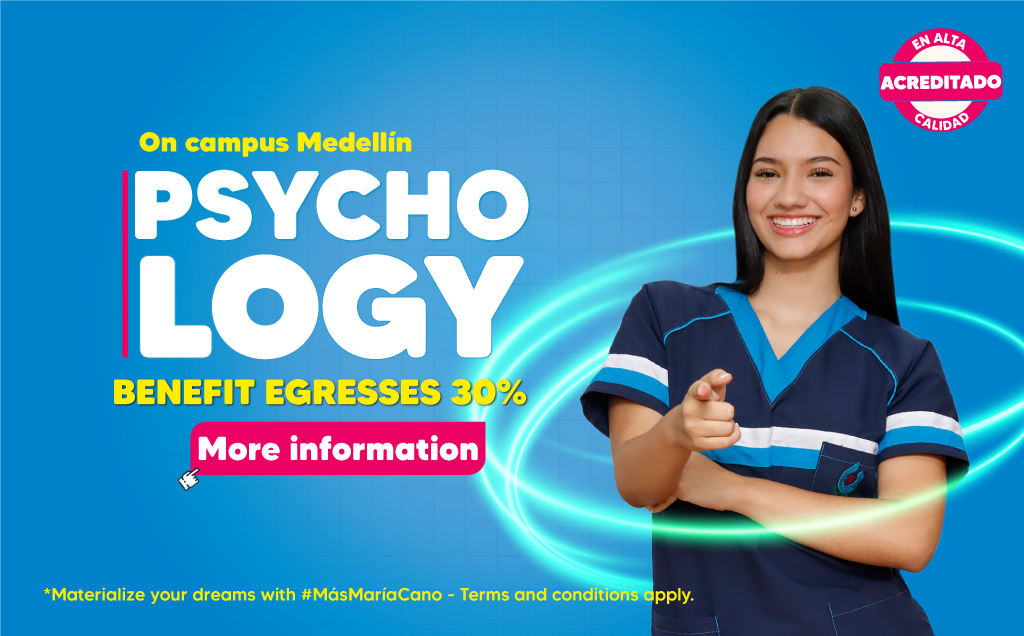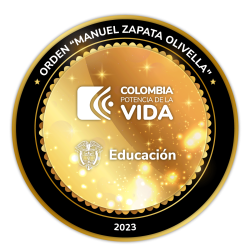What is Psicology?
Undergraduate psychology
Title awarded: Psychologist
Modality: face-to-face
SNIES face to face: 3802
Qualified registration: 008562 of May 24, 2023
Value 2025: $4.673.403 per semester
City: Medellín
Duration: 10 semesters
Number of credits: 171
High quality accreditation: Resolution No. 012031 of july 23, 2023 Valid for 4 years
Professional profile:
A professional with human quality, rational, critical and fundamentally ethical, with organizational psychology skills, clinical, educational and social community skills, capable of knowing, investigate, diagnose, assess and transform reality.
A professional with integrity, serving as a consultant, researcher, therapist, administrator and agent of change in the human and social development; committed to preventing diseases, a constant promoter of health and welfare, with ecological awareness and educated in order to respond to epistemological requirements, contextual, philosophical and ethical issues of its object of study.
Occupational profile
In the International Uniform Classification of Occupations Adapted for Colombia, the psychologist is in the primary group 2445 that has the action of studying human beings in terms of their behavior, normal and pathological and guiding on the most appropriate intervention according to the type of problem they present, in order to promote adaptation and development, both individual and social.
Occupational fields include: clinical psychology, educational psychology, sports psychology, and organizational psychology.
The María Cano Psychology program is an academic proposal that is articulated to the permanent transformation of the discipline, to an analysis of the local, national and international offer and to the observation of the mental health needs currently evidenced in the country. It is a program that supports the curricular transformation of its study plan in the institutional purpose of training professionals who recognize themselves as autonomous beings, with the ability to make decisions, to direct their training and learning process and to build their life project; therefore, they inquire, question, seek information, generate spaces for conversation, recognize their own abilities and put them at the service of others. Psychologists are people with critical thinking, social commitment and glocal vision. The Psychology program of the María Cano University Foundation is also distinguished by its social responsibility, reflected in the professional quality of its graduates and the contribution it makes to the quality of life of the community.
Admission Requirements Undergraduate Programs
Admission requirements New In-person and Virtual Undergraduate Applicant
To enter any of the undergraduate programs offered by María Cano, the new applicant must complete the following procedure:
- Fill out the online registration form
- Make the payment of undergraduate registration fees $141.144
- At the end of the registration form, upload to the platform the following documents one by one (in PDF format) as indicated at the end:
- Photocopy of the high school degree certificate or diploma, if you have not yet completed grade 11, original study certificate, issued by the school valid for no more than one month.
- Results of the ICFES tests (Saber 11), if you do not have the results you can attach the citation to the test.
- A legible photocopy of the identity document (enlarged).
- A 3×4 size photo, light blue background.
- Documents are not received physically unless required during the admission process.
- Print the registration payment form at the end of online registration or make payment through PSE.
*The Foundation reserves the right to admit and assign study schedules to students.
Curriculum
Study plan
Semestres
Credits
| Epistemology | 2 |
| Mathematics I | 2 |
| Skills communicative | 2 |
| Chair María Cano | 2 |
| Morphophysiology I | 3 |
| Introduction to Psychology | 3 |
| Introduction to health | 2 |
| Socio anthropology | 2 |
| TOTAL | 18 |
Credits 18
Credits
| Mathematics II | 2 |
| Critical reading | 2 |
| ICT management | 2 |
| Biochemistry | 3 |
| Neurophysiology | 4 |
| Biological bases of behavior | 2 |
| Developmental Psychology I | 3 |
| TOTAL | 18 |
Credits 18
Credits
| Geopolitics | 2 |
| Statistics | 2 |
| Psychological processes basic | 2 |
| Ethics | 2 |
| Public health | 4 |
| Personality theories | 2 |
| Developmental Psychology II | 3 |
| TOTAL | 17 |
Credits 17
Credits
| Human development | 2 |
| Research foundations | 2 |
| Higher psychological processes | 2 |
| Psychopathology I | 3 |
| Psychometry | 3 |
| Elective I | 2 |
| Epidemiology | 2 |
| TOTAL | 16 |
Credits 16
Credits
| Projects formulation | 3 |
| psychological deontology | 2 |
| Neuropsychology | 2 |
| Psychopathology II | 4 |
| Psychological Tests and Instruments | 3 |
| Disability and inclusion | 2 |
| Citizen skills | 2 |
| TOTAL | 18 |
Credits 18
Credits
| Project evaluation | 3 |
| Psychological current cognitive | 3 |
| Dynamic psychological current | 3 |
| Humanistic psychological current | 3 |
| Psychological evaluation I | 2 |
| Technology and innovation in health | 2 |
| TOTAL | 16 |
Credits 16
Credits
| Psychological evaluation II | 2 |
| Educational psychology | 2 |
| Emerging Occupational Fields | 2 |
| Clinical psychology | 2 |
| Community social psychology | 2 |
| Practice I (Community processes) | 4 |
| Security and health at work | 3 |
| TOTAL | 17 |
Credits 17
Credits
| Deepening Line I | 3 |
| Organizational and work psychology | 2 |
| Practice II (Clinical) | 8 |
| Health Services Administration | 2 |
| TOTAL | 15 |
Credits 15
Credits
| Practice III | 10 |
| Elective II | 2 |
| Deepening Line II | 3 |
| Innovation and creativity | 3 |
| TOTAL | 18 |
Credits 18
Credits
| Elective III | 2 |
| Practice IV (Field) | 10 |
| Line of deepening III | 3 |
| Entrepreneurship | 3 |
| TOTAL | 18 |
| TOTAL PROGRAM CREDITS | 171 |
Credits 18
Note: María Cano’s undergraduate and graduate academic programs may include classes on Saturdays.


